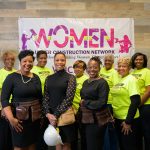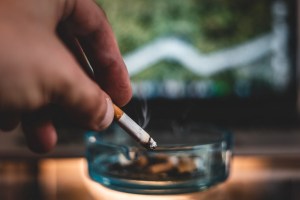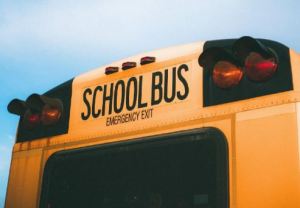Entrepreneur Shellie Layne, fifth from left, founded the WUCN in 2014, and it became an established 501(c)(3) organization in March 2015. The group, which is approaching its 10th anniversary, has grown along with the hundreds of women it has helped. (Amarr Croskey, For the Birmingham Times)
” data-medium-file=”https://www.birminghamtimes.com/wp-content/uploads/2024/03/WOMEN-300×200.jpg” data-large-file=”https://www.birminghamtimes.com/wp-content/uploads/2024/03/WOMEN-1024×683.jpg” />
By Je’Don Holloway-Talley | For The Birmingham Times
As both a volunteer and participant with the Birmingham-based Women Under Construction Network (WUCN), Elaine Porter, a retiree who lives in Pleasant Grove, Alabama, spends a lot of her free time repairing homes and lives.
” data-medium-file=”https://www.birminghamtimes.com/wp-content/uploads/2024/03/PORTER-210×300.jpg” data-large-file=”https://www.birminghamtimes.com/wp-content/uploads/2024/03/PORTER-718×1024.jpg” class=” wp-image-118992″ src=”https://www.birminghamtimes.com/wp-content/uploads/2024/03/PORTER-scaled.jpg” alt=”” width=”151″ height=”215″ srcset=”https://www.birminghamtimes.com/wp-content/uploads/2024/03/PORTER-scaled.jpg 1796w, https://www.birminghamtimes.com/wp-content/uploads/2024/03/PORTER-210×300.jpg 210w, https://www.birminghamtimes.com/wp-content/uploads/2024/03/PORTER-718×1024.jpg 718w, https://www.birminghamtimes.com/wp-content/uploads/2024/03/PORTER-768×1095.jpg 768w, https://www.birminghamtimes.com/wp-content/uploads/2024/03/PORTER-1077×1536.jpg 1077w, https://www.birminghamtimes.com/wp-content/uploads/2024/03/PORTER-1437×2048.jpg 1437w, https://www.birminghamtimes.com/wp-content/uploads/2024/03/PORTER-295×420.jpg 295w, https://www.birminghamtimes.com/wp-content/uploads/2024/03/PORTER-640×912.jpg 640w, https://www.birminghamtimes.com/wp-content/uploads/2024/03/PORTER-681×971.jpg 681w” sizes=”(max-width: 151px) 100vw, 151px” />
“I’m not physically working now, and [volunteering] is something for me to do and gives me the feeling of giving back,” said Porter, 64, who adds that the group also provides a sense of community.
“The women there are just like me,” she said. “They have something they need and something they can give. … As I give, I receive also. It’s the support and spiritual uplifting that I get from them.”
Entrepreneur Shellie Layne founded the WUCN in 2014, and it became an established 501(c)(3) organization in March 2015. The group, which celebrates its 10th anniversary founding this year, has grown along with the hundreds of women it has helped.
The WUCN has launched more than 10 community projects, most of which are in conjunction with city government initiatives, organizations, and businesses, mental health professionals, financial advisors, general contractors, and volunteers who all believe in giving back and servicing human needs.
Changing Lives
Layne often recalls testimonies of those like Porter and others during the group’s programs and projects, but there’s one that stands out and can summarize what her group does.
The woman had been following along with WUCN through Facebook and decided to visit a Saturday morning class at the Memorial Park Recreation Center in Birmingham, Layne said.
“This particular woman had never come to one of our events before, and the motivational nugget for that day was about seeing things a different way in your life. … She ended up winning one of the prizes, and when we asked her to come up and [claim her prize] she broke down in tears. She said, ‘You all have no idea what it means for me to be here today. I have no family here. I don’t have any assistance here. … When I got here, I felt like I was broken, but [being here makes me] feel like I’m part of something and that there is hope for me because before this I felt like I was suicidal.’”
“That’s where the WUCN has come into the lives of many families, said Layne.
“Not only is it a hands-on experience, but you’re fixing some things in your life and thinking about things you’ve never thought about,” she said. “You get a lot of clarity with this program. …. And while you’re learning these physical things and life parallels, there’s a component with this program that teaches you the love of God, a love for yourself, and how to address some things in your life.”
Porter, for instance, volunteers mostly with the REPAIR Angels—REPAIR is an acronym for Rebuilding Elderly Pride to Achieve Independence and Restoration– [and Angels] are the Contractors, Trade Professionals and Apprentices who perform the home repairs.
And the WUCN has also had an impact on Porter her and her family. Her aunt was among the elderly recipients who were surprised with Christmas caroling and gifts during the REPAIR Angels’ holiday outreach in December 2023.
“We came through on the big, orange city buses, we had on our angel wings and our halos, … and we brought gifts for 60 elderly women. It was awesome,” she said. “The Angels really blessed [my aunt]. Not only did the gifts and things they gave her bless her, but it also blessed her heart and got her through the depressive slump she was in. … My aunt is a dialysis patient [with] limited mobility, and she has experienced a lot of loss over these past two years. … At every house we [visited], you saw that glimmer of hope [because] we come in love.”
” data-medium-file=”https://www.birminghamtimes.com/wp-content/uploads/2024/03/WOMEN2-300×200.jpg” data-large-file=”https://www.birminghamtimes.com/wp-content/uploads/2024/03/WOMEN2-1024×683.jpg” class=”size-full wp-image-118994″ src=”https://www.birminghamtimes.com/wp-content/uploads/2024/03/WOMEN2.jpg” alt=”” width=”2400″ height=”1600″ srcset=”https://www.birminghamtimes.com/wp-content/uploads/2024/03/WOMEN2.jpg 2400w, https://www.birminghamtimes.com/wp-content/uploads/2024/03/WOMEN2-300×200.jpg 300w, https://www.birminghamtimes.com/wp-content/uploads/2024/03/WOMEN2-1024×683.jpg 1024w, https://www.birminghamtimes.com/wp-content/uploads/2024/03/WOMEN2-768×512.jpg 768w, https://www.birminghamtimes.com/wp-content/uploads/2024/03/WOMEN2-1536×1024.jpg 1536w, https://www.birminghamtimes.com/wp-content/uploads/2024/03/WOMEN2-2048×1365.jpg 2048w, https://www.birminghamtimes.com/wp-content/uploads/2024/03/WOMEN2-630×420.jpg 630w, https://www.birminghamtimes.com/wp-content/uploads/2024/03/WOMEN2-640×427.jpg 640w, https://www.birminghamtimes.com/wp-content/uploads/2024/03/WOMEN2-681×454.jpg 681w” sizes=”(max-width: 2400px) 100vw, 2400px” />
Home—and Life—Repair
The WUCN supports women, their children, and the elderly living in underserved communities. They use actual tools combined with corresponding life parallels to teach basic home repair and life repair techniques. They also work with contractors to perform minor home repairs for low-income elderly.
The organization’s leadership team is made up of 21, five staff members and 16 volunteers. It offers a virtual program—attended by participants from 19 states and 62 cities—that provides classes and workshops via Zoom. There are more than 1,200 subscribers to its monthly “What’s Happening” newsletter. Its Building Hope: 21 Days of Kindness program draws 200-plus volunteers. And there are hundreds of participants across the WUCN’s vast programming.
One of the organization’s signature programs is the What I Learned at Home (WILAH) Project, which is now a collaborative effort with the Housing Authority of the Birmingham District (HABD). It was one of the WUCN’s first initiatives.
“[The WILAH Project] was based on my life because I had become a divorced single mom,” said Layne. “Now that we’ve expanded to the HABD, where the majority of women [living in the housing communities] are low-income single mothers, the program caters to them.”
A key person in this collaboration is Jacqueline French, HABD director of workforce development, who was part of the 10-week WILAH Project pilot launch in 2017. She immediately saw how a partnership between the two organizations would benefit the community.
French helped to build the bridge that connects public housing residents with the WILAH Project, which is designed to foster self-esteem and self-efficacy using physical tools for home repair with metaphoric tools that help them perform life repairs.
She gave an example: “One week, we may have introduced how to use a hammer. Once we learned how to use a hammer, we learned a life parable that we could use as a hammer to fix our life and DIY projects.”
French added that she knows the benefits of the program first-hand.
“When I first started [with the WILAH Project], we learned how to splice wires,” she recalled. “One night [after that session], … I washed my hair, went to get my hair dryer, and [noticed that] my dog had chewed up the cord. … Right as I was about to throw [the hair dryer] away, it hit me that I had just learned how to splice wires, and I fixed it myself. I was so happy to be a part of a group that helped me save time and money. That was back in 2017, and it’s 2024—and I still have the hair dryer.”
Self-Sufficiency
The WUCN also helps public housing residents get on the path to home ownership, but only after equipping them with basic financial literacy tools.
“Sometimes you have to know the basics of things before you can get to your goals,” said Layne. “It’s almost like the principle that you can give a man a fish, but it’s so much more [beneficial] when you walk them through how to fish first.”
“We work as collaborative partners with banks to teach [residents] everything from credit repair to how to open a savings or checking account,” she added. “A good majority of women we work with have never had a checking account, and they don’t know how to write a check. The things we take for granted, many of the women we work with have never had a chance to do [those things] and are intimidated to do so. So, we bring the banks to them [to allow them to ask questions].
“Opening a checking account can be viewed as the least of their concerns, considering they are in survival mode. … We want to get them from survival to self-advocacy, and from survival to self-esteem. And then they go to homeownership if that’s their desire.”
“We then take those same tools and teach them what it means to use them in their lives. The tools help them build themselves emotionally. We build self-sufficiency and resourcefulness, but also it just helps them feel better about who they are,” Layne said.
” data-medium-file=”https://www.birminghamtimes.com/wp-content/uploads/2024/03/WOMEN8-300×200.jpg” data-large-file=”https://www.birminghamtimes.com/wp-content/uploads/2024/03/WOMEN8-1024×683.jpg” class=”size-full wp-image-119001″ src=”https://www.birminghamtimes.com/wp-content/uploads/2024/03/WOMEN8.jpg” alt=”” width=”2400″ height=”1600″ srcset=”https://www.birminghamtimes.com/wp-content/uploads/2024/03/WOMEN8.jpg 2400w, https://www.birminghamtimes.com/wp-content/uploads/2024/03/WOMEN8-300×200.jpg 300w, https://www.birminghamtimes.com/wp-content/uploads/2024/03/WOMEN8-1024×683.jpg 1024w, https://www.birminghamtimes.com/wp-content/uploads/2024/03/WOMEN8-768×512.jpg 768w, https://www.birminghamtimes.com/wp-content/uploads/2024/03/WOMEN8-1536×1024.jpg 1536w, https://www.birminghamtimes.com/wp-content/uploads/2024/03/WOMEN8-2048×1365.jpg 2048w, https://www.birminghamtimes.com/wp-content/uploads/2024/03/WOMEN8-630×420.jpg 630w, https://www.birminghamtimes.com/wp-content/uploads/2024/03/WOMEN8-640×427.jpg 640w, https://www.birminghamtimes.com/wp-content/uploads/2024/03/WOMEN8-681×454.jpg 681w” sizes=”(max-width: 2400px) 100vw, 2400px” />
WUCN PROGRAMS
WUCN has several programs designed to motivate, educate, and empower women of all ages and from all backgrounds by equipping them with home- and life-repair skills. Here are some of the programs:
REPAIR Angels
Pleasant Grove resident Porter often volunteers with the REPAIR Angels, who provide safe-at-home items to assist elderly women in functioning safely within their homes, helping to minimize slips, falls, and accidents. The Angels are “contractors, trade professionals, and apprentices who perform home repairs.” The program also has Angel Companion volunteers, who call on and perform emotional wellness checkups twice a month as part of the WUCN Senior Care Calls initiative; they spend time reading, sitting, and writing letters with elderly residents, as well as doing light meal prep and performing small tasks to help them combat depression and loneliness.
Layne told the story of a 98-year-old woman helped by the REPAIR Angels: “She’s outlived four of her five children, and she lives in a high-crime area. … Through our program, we were able to put lights all around her house. We partnered with contractors and some of our women assisted. She said, ‘They lit me up like a Christmas tree, and now I feel safe in my house.’ Her quality of life was improved by the repair work the Angels were able to do for her.”
Senior Care Calls
WUCN volunteers make calls to the elderly on the second and fourth Sundays of every month. These calls reduce isolation, as well as encourage, motivate, and serve as a checkup for the physical, mental, and emotional well-being of elderly women ages 65 and older.
French said, “One of my favorite initiatives is the Senior Care Calls. We’ve been able to get more volunteers, so we can do more and have been able to get more funding—don’t get me wrong, we can always use more funding. … I believe this organization is uniting women with their families. It’s healing hurt, healing pain, bringing joy, encouragement, and hope. That’s the biggest thing. A lot of people lose hope [at some point or another]. … Sometimes women are the heads and backbones of their families, and just knowing you are not by yourself and you do have someone to talk to and help you solve some of the problems in your house is [priceless].”
YT4Life (Youth Tools for Life)
A Safe Haven Initiative with Birmingham Parks and Recreation, YT4Life is designed to teach life skills and build self-esteem and self-confidence in youth through fun activities that use tools and home repair parallels in a safe and welcoming environment. The supervised after-school program for young people, ages 5 and older, is facilitated by motivational speakers, professionals, teachers, counselors, and contractors. YT4Life sessions are at the Ensley and Central Park recreational centers on Mondays and Wednesdays.
Mom’s Toolshed
This new program is based on creating a community for moms who have children with special needs. Mom’s Toolshed provides support and creates advocacy for children from birth through grade school and up to adulthood.
Winifred Patterson oversees the WUCN’s after-school program and youth division and serves as coordinator for the YT4Life and Mom’s Toolshed initiatives. She said, “Mom’s Toolshed is definitely a passion project because I know how it feels to have guilt and not want to talk to anybody about what’s going on. … Our first event was in February, and it was very successful. Moms got to talk about some issues that they don’t get to talk about, and their kids had the opportunity to socialize. We had activities [for the children] to do outside of being there with their moms, and they got to play. It was a good beginning.”
One of the topics discussed was parents being hesitant to take their kids to birthday parties, Patterson added, “because they aren’t sure how people would respond to their children, what kinds of questions they would be asked, [or whether] people would [stare] at their children. … [Mom’s Toolshed gives mothers] the opportunity to see their kids in a gym playing, being their authentic selves, stimming—[displaying self-stimulatory behavior that may help with the management of emotions; these can include repetitive body movements or noises, such as rocking back and forth while sitting or standing or repeating words or phrases]—screaming, and all. That’s just part of who they are, and it is fine. [Having] a place for their children to be accepted and have a social life really made an impact.”
Mom’s Toolshed will meet every third Saturday of the month at the Inglenook Recreation Center, from 10 a.m. to noon. Patterson said the rec center does not operate on the weekends during the summer months, so the program will facilitate planned outings.
To learn more about the Women Under Construction Network, visit wucnetwork.org.











